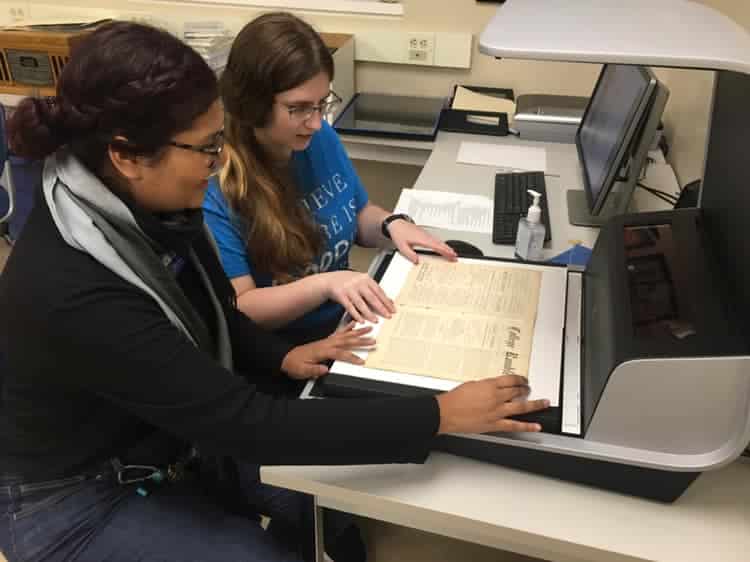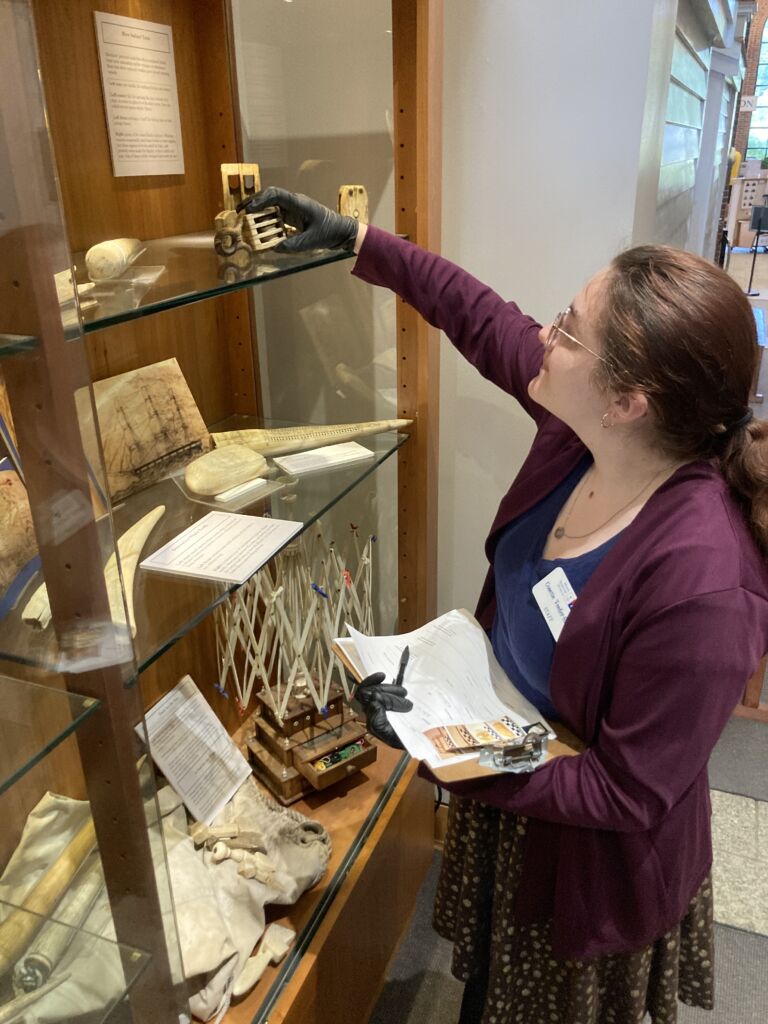
Abigail Chavez (left) with undergraduate Archives Student Assistant Alena Buckley ‘23. Chavez served as the Public History Graduate Intern with Illinois College (Jacksonville, IL), 2019.
By Virginia Angles and Samantha Sauer
Many arts and cultural heritage graduate programs require internships for graduation. Varying in scope, scale, and structure, successful internships balance the needs of stakeholders to create a mutually beneficial experience. Whether starting from scratch or revising a program, host organizations must consider their capacity to develop a successful graduate internship program.
Planning
From personnel (Do we have the right team to support an internship?) to projects (Are there initiatives appropriate for a graduate student?) and pay (How is this position being equitably compensated?), there are a number of factors to consider. Programs should be developed with strong communication from the start. Communication with HR staff can guide paperwork, payroll, and ensure the position meets institutional, state, and federal requirements. If the position is funded externally, frequent communication with advancement staff is important. Planning needs will vary. To pilot the graduate internship program with the museum and archives at Waffle House, Inc., Angles started conversations in fall 2022 before formalizing plans in winter for a summer 2023 internship. Communication may also serve as a form of internal and external advocacy. In developing a graduate internship program with the museum and archives at Illinois College, Sauer leveraged communication about the program’s development to purposefully increase the campus community’s awareness about the museum and archives.
If graduate interns aim to seek course credit from the experience, the organization, student, and university should collaborate to ensure requirements are met. Cultivating collaborations with nearby universities is also a strategic way to communicate internship opportunities across arts and cultural heritage networks, as well as connecting with engaged faculty and staff. Again, this may serve as a form of advocacy. When developing a graduate internship program at Maine Maritime Museum, Sauer promoted the position to local, regional, and national organizations, advertising the internship and, at the same time, increasing public awareness about the museum.

Cosette Veeder-Shave, Sandra D. Rapp Curatorial Intern, Maine Maritime Museum (Bath, ME), 2023.
Implementation and Documentation
Host organizations should foster clear communication about position expectations and compensation. Position descriptions should include details about prospective responsibilities, transferable skills, and learning outcomes. It is important to remember throughout that a graduate intern is an emerging professional pursuing a learning experience and not a full time professional member of the staff. If possible, host organizations should create capacity to support forms of professional development and continuing education as part of the program. When designing projects and refining priorities for the position, it is critical to consider project outcomes, i.e., “What will we have once this project is completed?” and “How can we break the project down into smaller milestones and deliverables?” During the interview and onboarding process, specific projects and objectives may be refined with the successful candidate, and establishing consistent schedules for meetings and communication preferences between the intern and supervisor early on will support solid and consistent communication.
Documentation throughout the program can allow all stakeholders to revisit successes and challenges. Documentation needs will vary. If credit-based, it can be helpful to align documentation with the university’s requirements. If the program is externally funded, documentation may support current and/or potential stewardship needs. Intern-led documentation practices may provide transferable skills and learning opportunities. Forms of intern-led documentation may include reflective practices such as short daily logs to track activities, brief weekly journals, and sharing a concluding paper and/or presentation. Logs and/or journals may serve as a record of the experience and strengthen communication skills, as well as help the intern draw connections between coursework and real-world applications. Sharing throughout can also create asynchronous opportunities for communication between the intern and supervisor, creating a digital space to share questions, comments, and concerns. Beyond written records and reflections, photographs are another effective form of documentation for all stakeholders.
Impact
Evaluation of projects, deliverables, and learning objectives should occur throughout the program in meetings to review progress and determine success or revision. Highlighting and sharing milestones during and following the program period is key for the intern, organization, and credit-granting institutions. This can be done through staff meetings, documentation, or via public platforms.In collaboration with relevant marketing or outreach staff, mindfully utilizing social media to lift up the intern, their contributions, and the organization is an excellent strategy to document and advance engagement.
There is no “perfect program” blueprint to create quality experience, but the potential impact of a graduate internship program may be immediate and long lasting.
Graduate internships can provide transformative learning experiences for all stakeholders, providing the arts and cultural heritage field with positive growth opportunities. Success in one environment may look different elsewhere. In developing a program to engage and support emerging professionals, it is important for host organizations to ask the question “Can we do this?” and, even more importantly, “Can we do this well?”
Virginia Angles now serves as the Archives, Records, and Media Hotline Manager with WK Kellogg Co. She previously served as the Archivist and Museum Director with Waffle House, Inc.
Samantha Sauer is a public historian and educator. She previously led the museum and archives at Illinois College, and she served as Director of Curatorial Affairs with Maine Maritime Museum.



